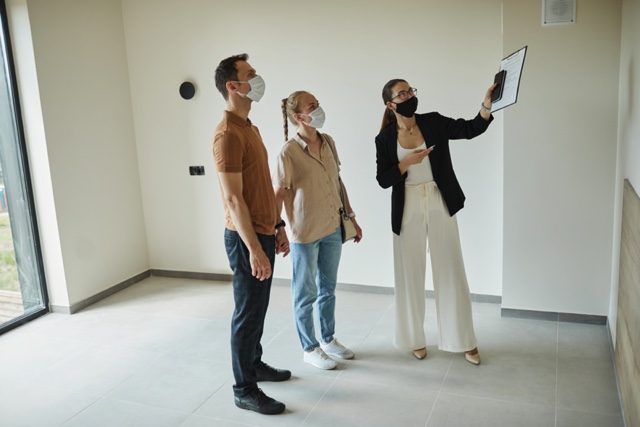
06 Aug How the pandemic has Forever Changed HOA Communities
It’s no secret that the COVID-19 pandemic has changed the way individuals live their lives, run businesses, and operate communities. We’ve seen unprecedented changes and a dramatic shift to a “new normal” across the world for simple, everyday operations. Like many other businesses and organizations, homeowners associations are one of the many environments that had to prepare for an extra level of safety regardless of their standard precautions. This meant taking additional steps for sanitization, shutting down common areas to prevent spread, ensuring employees were not sick or running a fever (for example checking their temperatures at the start of each day), and sharing accurate information to keep residents and guests informed of the latest updates.
Teamwork, resiliency, creativity, and ingenuity helped associations across the nation develop new ways to fight the spread of the virus. As a result, new responsibilities fell upon HOA management companies to guide onsite team members in the correct direction, recommend the suitable courses of action for dealing with the unknowns of the pandemic, and deal with something that they have never had to handle before. With this new virus came changes that continue to be used to ensure cleanliness, sanitization, and safety. Here are some of the many ways that HOA communities have been affected.
Safety & Cleaning
Studies determined that coronavirus could survive on surfaces for up to three days or longer, meaning new, robust, and more tedious cleaning practices had to be implemented for each community. Common areas such as pools, gyms, gathering rooms, or business centers had to be closed off; however, high traffic and essential areas (i.e., elevators, lobby, front desk, etc.) were monitored and cleaned frequently due to the threat of the illness.
The closeness of the residents in condominium communities posed a more significant threat than larger, single-family home communities for example, and frequent cleaning became critical. However, other than performing daily wipe-downs of common areas, simple efforts such as maximizing sunshine and natural light as well as allowing fresh air to flow through common areas proved to significantly reduce the virus’s surface life.
Adopting New Emergency Policies & Operations
Many, if not all, communities had to adapt to the new normal by updating rules and regulations and modifying their operations to respond to COVID appropriately. Board communication was critical here, especially at the beginning stages of the pandemic when most were unsure how to carry out day-to-day operations. Virtual Board meetings quickly became standard practice, and figuring out new ways to communicate was essential.
Communicating with Residents
Ensuring all residents were in the loop and updated on the latest information regarding community rules and regulations, CDC guidelines, and other safety aspects were often one of the top priority items after sanitization. Emails or telephone calls helped, as well as posting written announcements in common areas helped to spread the word – without spreading the virus.
Likewise, keeping residents occupied while stuck inside their homes became a challenge for many associations. Many overcame this with the introduction of Zoom meetings and hosting virtual resident events. While residents were disappointed when communities could no longer host regular in-person events, these virtual options still allowed them to get to know their neighbors and community team members. The virtual resident events gave communities a new way to reach their homeowners without breaching any safety guidelines and gave residents a way to stay connected without leaving their homes.
Accessing Reserve Funds in an Emergency
While many of the precautions could be taken with little to no cost to the association, it was more important than ever to have ample reserve funds in the event of a significant emergency during the pandemic, when money became very tight for many businesses and associations. Companies like Worth Ross Management help communities to manage their expenses and set up (or grow) their reserve funds for a fiscally responsible future – and have more than enough available in case the community needed to be protected at some point in the pandemic.
The sharp increase of residents moving to temporary or permanent work-from-home situations or losing their jobs altogether caused a rise in systems being used more (air conditioning systems or heating systems, plumbing, and water systems). This spike in usage resulted in a need for maintenance more often or, in some cases, complete replacement of systems to meet the usage demands of more people staying home full-time. The unexpected failure of said systems can put a huge, irreparable dent in an association’s reserve funds and puts unnecessary strain on Board members to gather funds quickly for the next repair. On the other hand, having ample reserve funds protects the community, its team members, and its residents from having to suffer due to insufficient cash on hand.
If your community is still facing the detrimental effects of the pandemic and you haven’t found the right solutions yet, it might be time to find a new management company. The right company will guide your association through the complex management maze and keep your property swimming instead of only keeping your head above water. Management companies like Worth Ross Management Company have the tools, resources, and experience to help your community flourish and thrive so your residents can enjoy their living experience. Reach out to us today if you’d like to learn more about our wide array of services and how we can help you reach your fullest potential.


